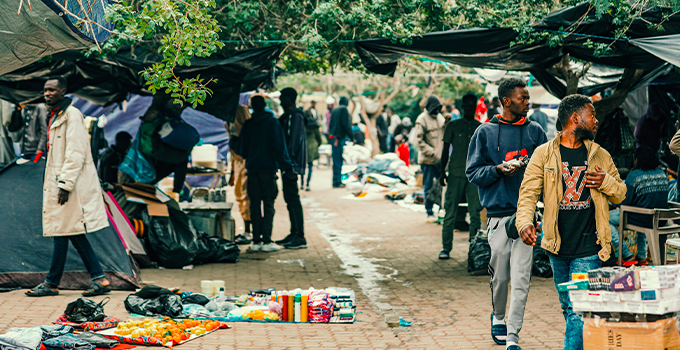Conclusions
The six gray zones in the thinking and practice of mainstream Islamist movements—Islamic law, violence, pluralism, civil and political rights, women’s rights, and religious minorities—are extensive and impact a number of crucial political issues. The resolution of these issues will determine whether the rise of Islamist movements leads the countries of the Arab world, finally, toward democracy or, conversely, to a new form of authoritarianism with an Islamic character.
The ambiguous position of many Islamist movements on these crucial issues is a matter of concern because such movements are emerging as major players in the changing political landscape of the Middle East. Further political openings will only enhance the importance of Islamist parties for the foreseeable future.
For international organizations and foreign governments convinced that democratic transformation of the Middle East is crucial to the security of the rest of the world, the fact that the most important opposition movements in most countries appear stuck between religious dogma and democratic political choices is problematic. It would, of course, be much more reassuring, much more desirable, if the major political actors in the Middle East were secular organizations with impeccable liberal credentials and a clear track record of democratic politics. But liberal organizations capable of mobilizing large constituencies simply do not exist in Arab countries today. As a result, Islamist groups will remain the most important opposition force for the foreseeable future, whether or not secular Arabs and Western governments like it. Only repression could curb the influence of Islamist movements. The experience of Algeria, which suffered a bloody civil war after elections were canceled in 1992 to deny the expected victory to Islamists, offers a reminder that repression has a high cost.
Mainstream Islamist organizations are so influential because they have little competition. No ideology in the Arab world has at present the appeal of the Islamist message, which powerfully combines a religious ideal with the concept of social justice—a concept concretely embodied in the network of service organizations that Islamist parties have set up in many countries. Liberal democrats have been unable so far to fashion a message attractive to large numbers of their countrymen. Their abstract message about democracy resonates only at a very general level and has failed to serve as the basis for political mobilization. Arab citizens are not averse to democracy, as a growing number of public opinion surveys shows. When provided with an opportunity to participate in an open political process, they do so. Yet, when they vote, they do not choose to cast their ballots for liberal democratic parties. The socialist message of the Nasserite organizations and the Ba’ath parties of Syria and Iraq was once extremely influential but has now lost its attraction, and the segment of the message that still resonates, that of social justice, has been appropriated by the Islamists. Remarkably, Islamist movements have managed to incorporate key elements of the liberal platform—demands for accountability, constitutional reform, an end to political repression, and clean government—into their agenda. Indeed, the only true ideological competition Islamist parties face in the Arab world is ethnic or religious nationalisms. As Iraq shows, the unleashing of such nationalisms is a serious obstacle to democratic transformation.
Organizationally, too, moderate Islamists are a world ahead of other parties or movements. In
part this is because they have been able to circumvent the obstacles Arab governments place in the way of any independent political organization by using mosques as meeting places and religion as their message. Partly, too, their success is the result of their clear understanding of the importance of creating organizations and mobilizing constituencies in a systematic fashion, something other parties have neglected.
Because of the ideological advantage enjoyed by Islamist groups and the years of work that many have invested in organizing, the possibility that the already existing or new non-Islamist parties will be able to compete effectively with them in the near future is not good. We are not implying that Middle East countries will never be able to generate effective secular parties ; rather, that Islamists have had a headstart, and in the next electoral cycle and beyond, they will likely be the most important opposition force in most countries. Democracy assistance in the neutral form of training for all political parties, or even in the form of direct funding of secular parties and liberal civil society organizations, will not alter this reality.
As a result, the future direction of moderate Islamist movements depends greatly on how they work their way through the murkiness of the gray zones as they react to the challenges of the changing political context in their countries. Aging leaders, popular dissatisfaction, international pressure, and of course the growth of Islamist movements, are all factors forcing Arab governments to introduce some reforms and to take some steps in the direction of democracy. Most of the measures introduced thus far are largely cosmetic—no regime save the Palestinian has given up significant power to fairly elected institutions. But even such cautious steps have created new possibilities for organized opposition forces, and thus, for Islamist parties.
Studies of political transitions suggest that new challenges and opportunities tend to produce
splits within governing coalitions between hardliners who want to perpetuate the status quo and the reformers who want to move forward. Less discussed is the fact that opposition organizations also react to new challenges by developing the same kinds of internal divisions. In all mainstream Islamist movements today, there are tensions between more open-minded, often younger members who think the situation requires new ideas and political tactics and the old guard, hesitant to abandon the old positions. Given the political influence of Islamist movements, the outcome of this struggle will determine the future of political reform in many countries.
The balance between reformers and hardliners differs from one Islamist movement to another. Reformers are clearly the most influential force in the Moroccan PJD and the Egyptian Wasat Party ; in fact, the latter was launched by a breakaway reformist faction of the Muslim Brotherhood. These parties have put forward alternative ideological formulas that retain the overall Islamic orientation of the movement while gaining the necessary political maneuvering room. In the PJD’s platform, insistence on the application of the sharia is replaced by a loose reference to general Islamic guidelines (al-maqasid al-‘amma). The 2004 Wasat Party program calls for establishing a democratic political system in Egypt within the framework of the Islamic marji`iya. In other movements, such as the Jordanian Islamic Action Front and the Egyptian Muslim Brotherhood, however, the reformists have not yet won the battle.
The outcome of these internal battles will be influenced by how the governments of the respective countries deal with the Islamist groups and, to a lesser extent, by the position taken by outside players, particularly the United States. In countries where the government chooses heavy-handed repression as the means to deal with the growing influence of mainstream Islamist movements, the reformers may very well lose out. In fact some studies have already shown that the influence of the reformers in the Egyptian Muslim Brotherhood has waxed when the government has allowed some form of political participation and waned when the government turned more repressive. Political success in a pluralist electoral system, on the other hand, strengthens the side of reformers and encourages parties to change even further. Experiences of some Islamists outside the Arab world—especially that of the AKP in Turkey—suggest that movements that take on government responsibility or even succeed in forming viable opposition blocs are under pressure to deliver concrete changes to their constituencies and thus move beyond rigid ideological stances. Only when Islamists are totally shut out of legitimate political participation—or, conversely, when they achieve total domination (as in Iran)—do they avoid these pressures.
No matter what happens on the wider political scene, however, the murkiness of the gray zones is not going to disappear completely any time soon. Nor will the suspicions of Middle East governments, other opposition parties, and Western governments. After more than three years of democratic behavior after its victory in the 2002 elections, Turkey’s Justice and Development Party is still regarded with suspicion by some inside the country, including elements of the military. Doubts also linger abroad, although both the United States and European countries have at times singled out Turkey as the proof that Islamist parties can embrace democracy.
The persistence of doubts is inevitable. Even if Islamist parties take moderate positions while fighting for a legitimate political role, nobody can be sure how they would act if they gained power. By extrapolating from past experiences, it is possible to forecast probable trends but not to offer certainties.
Uncertainty is a fact of life in politics. It is a defining feature of democratic politics. Evidence from the research leading to this analysis suggests that the reformist currents in the Islamist movement are real, that they are becoming much more sophisticated and flexible in their thinking, and that recent political success in some countries is increasing their influence within their respective organizations. It also suggests that gray zones remain extensive. Finally, the evidence suggests that in most Arab countries there is no possibility of encouraging a process of democratization or at least of liberalization, without seeing at the same time the increased influence of Islamist movements. We can only conclude that a policy of engagement with Islamist organizations, particularly with their reformist wings, is the only constructive option open to organizations and governments that believe democratic development in the Middle East is in everybody’s interest.
About the authors :
Nathan J. Brown, Amr Hamzawy, and Marina Ottaway are senior associates at the Carnegie Endowment for International Peace. Combined, they have authored more than ten books on issues including democracy promotion in the Middle East and Arab politics.
Source : Carnegie Endowment March , 2006.




iThere are no comments
Add yours